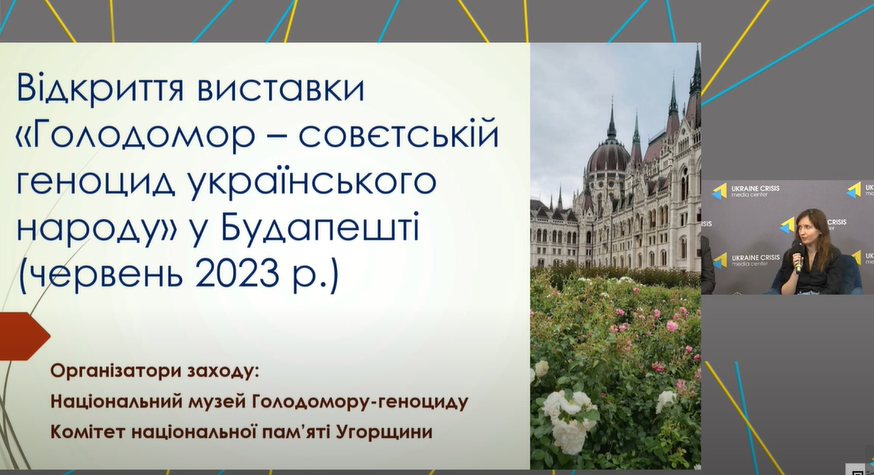The exhibition in Hungary is a reminder of the price of forgetting the crimes of the past
We have already reported that the exhibition of our Museum, “Holodomor – Soviet Genocide of the Ukrainian People,” opened in Budapest on June 6. Our employees told more about the exhibition, the importance of cultural diplomacy, as well as cooperation with the Committee of National Remembrance of Hungary during a press conference at the Ukrainian Crisis Media Center. Candidate of historical sciences Ihor Stambol moderated the event.
“It’s no secret that Hungary is the most difficult partner in the EU in terms of supporting Ukraine,” said Andrii Ivanets, a leading researcher at the Holodomor Museum, who represented our institution at the exhibition opening. – And it is precisely such connections between cultural institutions that help to establish positive contacts. At the same time, we see many people in Hungary understand what is happening in Ukraine, sympathize and support it.”
He thanked the Committee, which implemented this initiative at the proper level. But he recalled that Hungary was the second country in Europe to recognize the Holodomor as genocide. It happened in 2003. Despite the difficulties, the Ukrainian community managed to lobby for this issue.
Yana Hrynko, head of the exposition and exhibition department, spoke about how the exhibition became possible in Hungary.
“In the first days of the war, as an employee of the museum and as a citizen, I was outraged by the position of Hungary and the public silence of the Committee of National Remembrance of Hungary because Hungary is one of those countries that also survived the Soviet occupation and has a traumatic past. I applied to the Platform of European Memory and Conscience, and I was connected quickly to the Committee.In the course of communication, we managed to agree on the exhibition. Given the complicated relations with Hungary, it was crucial for us to implement this cultural project to remind people of the price of forgetting the crimes of the past.”
Andrii Ivanets also spoke about the activities of the Society of Ukrainian Culture in Hungary, the head of which, Mrs Yaroslava Khortiani, at one time became the driving force of the process of recognition of the Holodomor as genocide by this country. In particular, the association published the book “Zaviriukha” (“Hovihar”) by the Ukrainian writer Oles Volia in Hungarian.
“The Ukrainian diaspora in Hungary does a lot to convey the truth about the Holodomor to the Hungarian society. In the end, there was a request for an art book because there was scientific information, but it needed to reach the hearts of every Hungarian. Nicoletta Olas-Khortyani is translating this book into Hungarian.And one of the former presidents of the country contributed financially to its publication, then the Ukrainian embassy got involved, and there was a second edition. This book was quite well distributed, and is in many libraries of the country.”
